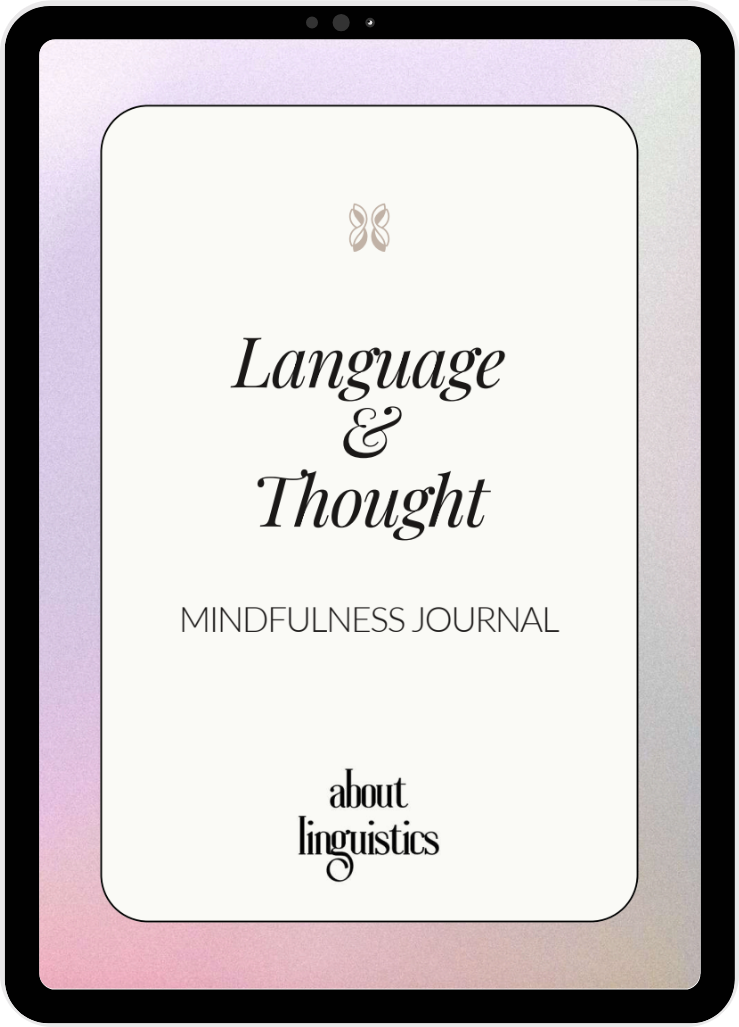Think about the last time you did any of the following:
- Come up with a pun
- Find a pun to be funnier than it should be
- Write a sentence that doesn't read quite right
- Notice two words that rhyme
- Feel excited about playing a word game
In that very moment you were experiencing metalinguistic awareness.
What is it exactly?
Metalinguistic awareness is the ability to pause and reflect about language instead of just using it in an automatic way.
To communicate, we use language without thinking about it explicitly. We talk, listen, write, and read focused on the content of the message, as opposed to the characteristics of the message itself.
When we talk or think about language though, something else happens. We're stepping outside of it, we're paying attention to specific features that we can only notice if we actively think about them.
5 components of metalinguistic awareness
Phonological awareness
What does it mean? To make sense of the sound structure of language
Examples of when it's used: When learning to read as a child, noticing different accents, identifying different languages while walking down the street, enjoying rhymes in songs.
Syntactic awareness
What does it mean? It refers to understanding grammar and the structure that sentences have.
Examples of when it's used: Whenever we judge grammatical correctness, when we edit a text, or when learning the grammatical rules of a foreign language.
Semantic awareness
What does it mean? To think of relationships between words and word meaning.
Examples of when it's used: When learning new vocabulary, making word associations, observing multiple meanings of the same word, or understanding humour.
Pragmatic awareness
What does it mean? To understand context and the use of language in social settings.
Examples of when it's used: When adjusting speaking styles, such as a more professional or informal one, or when recognising sarcasm.
Word awareness
What does it mean? To treat words as individual units that can be identified, counted, and played with.
Examples of when it's used: When playing word games, writing poetry, writing advertising slogans, analysing word choice in literature, or spotting repeated words in a text.
Language & Thought Mindfulness Journal
A short, guided digital journal that helps you notice unhelpful inner language patterns and build clearer, kinder self-talk in 10-15 minutes a day.
The benefits of metalinguistic awareness
I've compiled here the main benefits of metalinguistic awareness. They expand across the fields of communication, reading, writing, language learning, and self-improvement.
- It makes reading easier and more enjoyable
- It improves the speed at which you learn a new language
- It makes conversations more efficient because you're using your words carefully
- It boosts creativity when it comes to thinking of puns, wordplays, or riddles
- You become more efficient at getting jokes
- Also at coming up with them
- It also helps in creative writing
- It gives you confidence when experimenting with sentence structure and style
- You get to understand how the language you use influences your mood
- In turn, you can improve your mood by using language mindfully
There are more, but with these you can get the gist of it.
How can you develop better metalinguistic awareness?
Like many things in life, metalinguistic awareness is something you can practice and get better at.
I'm listing below some of the best things you can do to improve your ability to observe and work with language.
Write like a reader and speak like a listener
When producing speech or written text, think of the people who will listen to read your production. Is the language clear enough? Can it be understood by the audience that it's being targeted to? Would you prefer your content to be different if you were the one listening to it or reading it?
Read like a writer and listen like a speaker
This is an opportunity to learn about the creative process of the author. For example, if while reading a book you occasionally wonder why the chapter starts the way it does, or why this adjective in particular is being used, you can get a deeper understanding of the content and the thought process the author went through to create it, which can give you ideas for when you work on your own creations.
Study foreign languages
Even minimal exposure to other languages can give you new perspectives on how human language works. Along the way you'll come across sentence structures that sound counter intuitive, word meanings that don't have a direct equivalent in your language, sounds that you might not be able to accurately reproduce. It's not only very interesting (in my view), but also enriching when it comes to improving your metalinguistic awareness skills.
Practice linguistic problem-solving
You can try challenging yourself with exercises that train your brain to take notice of how language is structured. For example by playing word games or solving linguistic puzzles (like finding out the origins of words, wordladders, anagrams, or palindromes).
Explain linguistic concepts outloud
When you explain a linguistic concept to someone, you switch from using language automatically to reflecting on how it works (which is for example what I'm doing now). You can try explaining a grammar rule, the origin of a word, or why a certain pun is funny.
Practice mindful language
You can also improve your metalinguistic awareness skills by paying close attention to the language choices you make in your daily life. You might also notice that these choices actually have an impact on your mood and wellbeing.
For example you could catch yourself saying 'I'm so bad at this', when in reality you're just learning a new skill, so you could say 'I haven't acquired this skill yet'. By the way, I created a whole journal with extra resources to help people with this, you can find it here if you're interested.
Final notes
I hope you've found this article useful and that you will take some insights with you to implement in your daily life. Because of my passion for linguistics, I practice these kinds of exercises often, sometimes even without realising, and I can see that they provide real benefits.
Feel free to connect on Bluesky or X to let me know if you've implemented any of the techniques above and if you're seeing any results! :)




